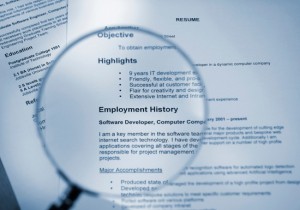#JobSearch : How To Write A Resume Objective Statement That Will Land You That Interview. First Tip: Learn What it Is. Do you Know & What is It?
Resume objective statements have never made the most sense to me. The objective of a resume is obvious—it’s to get a job. Trust me, I’m not writing one for fun. It’s not a Bluesky skeet or anything like that.
But in these tough economic times, it can never hurt to be too careful when it comes to expressing yourself well in job applications. Whether you’re a new grad looking to land that first gig out of college, a freelancer looking to upgrade to full-time, or someone looking for a new job after years at the same place, a tight resume can be the key to getting you through the door. And it starts with a resume objective statement.
Here are a few tips for writing a resume objective statement that will land you that coveted interview.
What Is a Resume Objective Statement?
My first tip for writing a banger resume objective statement is to learn what it is. Don’t skip this step! A resume objective statement is a brief statement at the beginning of a resume that summarizes the career goals and objectives of the job applicant. That’s it!
Like this Article? Share It! You can now easily enjoy/follow/share Today our Award-Winning Articles/Blogs with Now Over 2.5 Million Growing Participates Worldwide in our various Social Media formats below:
Daily FSC Career Blogs/Articles for Today’s Job Search (Over 12K Daily Readers) : https://www.linkedin.com/search/results/all/?keywords=FSC%20Career%20Blog%20&sid=TL)
Best of FSC Career Blogs on LinkedIn with over 2.5 Reads: Go to your profile and then to the top left to go to the Search bar, then type: #BestofFSCBlog
Connect with us on LinkedIn (under Chris G. Laughter) : https://www.linkedin.com/in/chris-g-laughter-b46389198/
Twitter: Follow us @ firstsunllc
Best Daily Choice: Follow the Best of FSC Career Articles/Blogs @
https://twitter.com/search?q=bestoffscblog&src=typeahead_click
Question: Searching for ‘the Best Daily Career Search Articles/Blogs on the web’ on Job Search, Resume, Advancing/Changing your Career, or simply Managing People?
Answer: Simply go to our FSC Career Blog below & Type(#Jobsearch, #Resume, or #Networking) in Blog Search: https://www.firstsun.com/fsc-career-blog/
What Skill Sets Do You have to be ‘Sharpened‘?
Did you know? First Sun Consulting, Llc (FSC) is celebrating over 32 years in delivering corporate & individual outplacement services & programs to over 1200 corporate clients in the U.S., Canada, the UK, & Mexico! Visit & contact us @ www.firstsun.com
We here at FSC want to thank each of our corporate partners for the opportunity to serve & moving each of their transitioning employee(s) rapidly toward employment!
Article continued …
Be Specific
Your objective statement should be specific to the job you’re applying for. Make sure you read the description carefully and highlight the skills and experience you have that are relevant to the position. If you have a particular goal in mind, such as working in one specific industry or becoming a manager, you can include that in your objective statement. Just make sure it’s tailored to the job you’re applying for. For example, if you want to work in sales, don’t say that you want to become a vet (learn from my mistakes!).
Ideally, use exact words from the job description in your resume objective statement. This means—I’m so sorry to say—that you need to write a new one for every position you’re applying to. It does pain me to tell you this, but one day you’ll have a job with healthcare, and you’ll thank me. And it doesn’t have to be entirely new—slight tweaks go a long way.
Be Succinct
Your objective statement should be concise and to the point. Fewer words is always better, and this is true across all mediums—resume statements, break-up texts, etc. Aim for one or two sentences that summarize your skills and experience as they relate to the job.
The resume objective statement is located right below your contact information. It might not be the most important part of the resume—that really depends on what the employer is looking for, and whether or not they’re seeking someone with super specific experiences—but it is the first thing they read. Get to the point and leave them wanting more!
Highlight Your Value
Your objective statement should make clear what value you can bring to the employer. Think about what sets you apart from other candidates and what skills or experiences you have that would make you an asset to the company. If you don’t have any skills, acquire some! Or, expand your definition of a skill. In my opinion, in this day and age, any attitude other than nihilism counts as a skill (but don’t put that on your resume). In all seriousness, though, skills as broad as social media, effectively using ChatGPT, or public speaking can appear in a resume objective statement if it aligns with the job you’re applying for.
Be Unique
To whatever extent possible, I recommend trying to avoid cliches. You’re trying to get your resume to stand out from hundreds of others. Phrases like “seeking an exciting role” or “looking to develop my skills” or “hire me rent is so high” are overused and don’t add much value to your objective statement. Instead, focus on specific skills or experiences that would make you a good fit for the job. My advice? Throw in the word “myriad.” It fits into every sentence, and there are myriad benefits to showing off your vocabulary in this way.
Once you have that perfect resume objective statement, you’re well on the way to the next challenge: acing an interview. Good luck!

